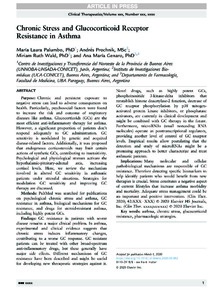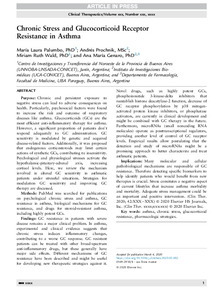Por favor, use este identificador para citar o enlazar este ítem:
https://repositorio.uca.edu.ar/handle/123456789/10052| Título: | Chronic stress and glucocorticoid receptor resistance in asthma | Autor: | Palumbo, María Laura Prochnik, Andrés Wald, Miriam Ruth Genaro, Ana María |
Palabras clave: | ASMA; CORTICOIDES; TRATAMIENTO MEDICO; TRATAMIENTO FARMACOLOGICO; ESTRES; FACTORES PSICOLOGICOS | Fecha de publicación: | 2020 | Editorial: | Elsevier | Cita: | Palumbo, M. L., et al. Chronic stress and glucocorticoid receptor resistance in asthma [en línea]. Postprint del artículo publicado en Clinical Therapeutics. 2020. doi: 10.1016/j.clinthera.2020.03.002. Disponible en: https://repositorio.uca.edu.ar/handle/123456789/10052 | Resumen: | Abstract: Purpose: Chronic and persistent exposure to negative stress can lead to adverse consequences on health. Particularly, psychosocial factors were found to increase the risk and outcome of respiratory diseases like asthma. Glucocorticoids (GCs) are the most efficient anti-inflammatory therapy for asthma. However, a significant proportion of patients don’t respond adequately to GC administration. GC sensitivity is modulated by genetic and acquired disease-related factors. Additionally, it was proposed that endogenous corticosteroids may limit certain actions of synthetic GCs, contributing to insensitivity. Psychological and physiological stresses activate the hypothalamic-pituitary-adrenal axis, increasing cortisol levels. Here, we review the mechanism involved in altered GC sensitivity in asthmatic patients under stressful situations. Strategies for modulation GC sensitivity and improving GC therapy are discussed. Methods: PubMed was searched for publications on psychological chronic stress and asthma, GC resistance in asthma, biological mechanisms for GC resistance, and drugs for steroid-resistant asthma, including highly potent GCs. Findings: GC resistance in patients with severe disease remains a major clinical problem. In asthma, experimental and clinical evidence suggests that chronic stress induces inflammatory changes, contributing to a worse GC response. GC resistant patients can be treated with other broad-spectrum anti-inflammatory drugs, but these generally have major side effects. Different mechanisms of GC resistance have been described and might be useful for developing new therapeutic strategies against it. Novel drugs, such as highly potent GCs, phosphoinositide 3-kinase-delta inhibitors that reestablish histone deacetylase-2 function, decrease of GC receptor phosphorylation by p38 mitogenactivated protein kinase inhibitors, or phosphatase activators, are currently in clinical development and might be combined with GC therapy in the future. Furthermore, microRNAs (small noncoding RNA molecules) operate as posttranscriptional regulators, providing another level of control of GC receptor levels. Empirical results allow postulating that the detection and study of microRNAs might be a promising approach to better characterize and treat asthmatic patients. Implications: Many molecular and cellular pathobiological mechanisms are responsible of GC resistance. Therefore detecting specific biomarkers to help identify patients who would benefit from new therapies is crucial. Stress consitutes a negative aspect of current lifestyles that increase asthma morbidity and mortality. Adequate stress management could be an important and positive intervention. Key words: asthma, chronic stress, glucocorticoid resistance, pharmacologic strategies. | URI: | https://repositorio.uca.edu.ar/handle/123456789/10052 | ISSN: | 0149-2918 (online) | Disciplina: | MEDICINA | DOI: | 10.1016/j.clinthera.2020.03.002 | Derechos: | Acceso abierto. 12 meses de embargo | Fuente: | Clinical Therapeutics. 2020 |
| Aparece en las colecciones: | Artículos |
Ficheros en este ítem:
| Fichero | Descripción | Tamaño | Formato | |
|---|---|---|---|---|
| Chronic Stress and Glucocorticoid Receptor.jpg | 957,66 kB | JPEG |  Visualizar/Abrir | |
| chronic-stress-glucocorticoid-receptor.pdf | 853,92 kB | Adobe PDF |  Visualizar/Abrir |
Visualizaciones de página(s)
128
comprobado en 30-abr-2024
Descarga(s)
1.033
comprobado en 30-abr-2024
Google ScholarTM
Ver en Google Scholar
Altmetric
Altmetric
Este ítem está sujeto a una Licencia Creative Commons

